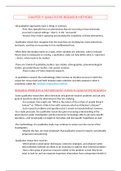CHAPTER 9: QUALITATIVE RESEARCH METHODS:
-All qualitative approaches have 2 things in common.
-First, they typically focus on phenomena that are occurring or have previously
occurred in natural settings—that is, in the “real world.”
-Second, they involve capturing and studying the complexity of those phenomena.
-Qualitative researchers recognize that the issue they are studying has many dimensions
and layers, and they try to portray it in its multifaceted form.
-When little information exists on a topic, when variables are unknown, when a relevant
theory base is inadequate or missing, a qualitative study can help define what is important
—that is, what needs to be studied.
-There are 5 kinds of qualitative studies: case studies, ethnographies, phenomenological
studies, grounded theory studies, and content analyses.
-There is also a 6th kind, historical research.
-In qualitative research the methodology often involves an iterative process in which the
researcher moves back and forth between data collection and data analysis in what is
sometimes called the constant comparative method.
RESEARCH PROBLEMS & METHODOLOGY CHOICE IN QUALITATIVE RESEARCH:
-Some qualitative researchers often formulate only general research problems and ask only
general questions about the phenomenon they are studying.
-For example, they might ask, “What is the nature of the culture of people living in
Samoa?” or “What is it like to live with someone who has Alzheimer’s disease?”
-Such research problems and questions don’t remain so loosely defined, however.
-As a study proceeds, the qualitative researcher gains increasing understanding of the
phenomenon under investigation and thus becomes increasingly able to ask more specific
questions—and occasionally can begin to formulate and test specific hypotheses as well.
-The methodology of a qualitative study may continue to evolve over the course of the
investigation.
-Despite this fact, we must emphasize that qualitative research requires considerable
preparation and planning.
-Qualitative researchers must be;
-Well trained in observation techniques, interview strategies, and whatever other
data collection methods are likely to be necessary to address their research problem.
-Have a firm grasp of previous research related to the problem so that they know
what to look for and can separate important information from unimportant details in
, what they observe (some grounded theory studies are exceptions, for reasons you
will discover shortly).
-Must be adept at wading through huge amounts of data and finding a meaningful
order in what, to someone else, might appear to be chaos. For these reasons, a
qualitative study can be a challenging task indeed.
POTENTIAL ADVANTAGES OF A QUALITATIVE APPROACH:
1. Exploration: They can help you gain initial insights into what has previously been a
little-studied topic or phenomenon.
2. Multifaceted Description: They can reveal the complex, possibly multi-layered
nature of certain situations, settings, processes, relationships, systems, or people.
3. Verification: They allow you to test the validity of certain assumptions, claims,
theories, or generalizations within real-world contexts.
4. Theory Development: They can enable you to develop new concepts or theoretical
perspectives related to a phenomenon.
5. Problem Identification: They can help you uncover key problems, obstacles, or
enigmas that exist within the phenomenon.
6. Evaluation: They provide a means through which you can judge the effectiveness of
policies, practices, or innovations.
Qualitative studies do not allow you to identify cause-and-effect relationships.
-To answer questions such as “what caused what?” or “why did such-and-such
happen?”
You will need quantitative research, especially experimental studies, to answer questions of
this kind.
QUALITATIVE RESEARCH DESIGNS:
-Qualitative research methods are the least prescriptive.
-There are no magic formulas, no cookbook recipes for conducting a qualitative study.
1. Case Study:
-Sometimes called idiographic research.
-An individual, program, or event is studied in depth for a defined period of time.
-Sometimes researchers focus on a single case, perhaps because its unique or exceptional
qualities can promote understanding or inform practice for similar situations.




